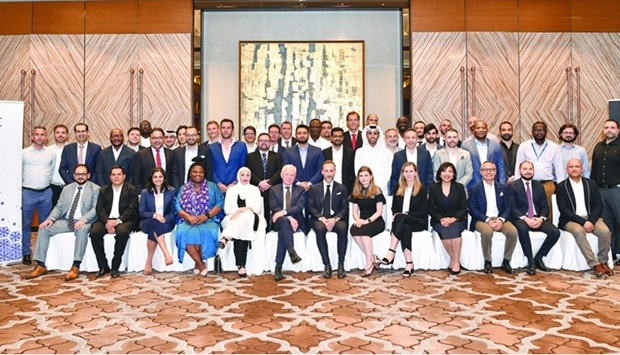HEC Paris in Qatar, the regional campus of HEC Paris, recently ranked No. 1 in Executive Education and No. 1 EMBA by the 'Financial Times', has concluded an intensive ‘Energy Specialisation Week’, one of the nine specialisations that participants can choose from as part of the curriculum in the HEC Paris Executive MBA programme.
The ‘Energy Specialisation Week’, which will culminate in a second module in Berlin this October, attracted 46 participants from 27 nations across the Middle East, Asia, Russia, India, Africa and South America. Participants gained a comprehensive understanding of crucial global energy markets and the major trends shaping the sector, including the renewables revolution.
The HEC Paris part-time Executive MBA is designed to be compatible with participants’ professional careers, to give them the comprehensive, innovative, and applicable knowledge and skills to fine-tune their analytical and strategic decision-making and expand their industry network. The EMBA features four key components - Core Courses, Leadership Development, Specialisations and a Capstone Project - allowing participants to generalise, specialise and customise the programme to fit their specific goals.
The next intake for the EMBA in Doha is in February 2023.
Participants attended a series of lectures, presentations and simulations focused on the global energy industry scenario until 2050, its geo-economics and geo-politics, the management of an energy crisis, the fundamentals of the gas, LNG, upstream and downstream oil markets, the renewables revolution, and the financing of its transition.
The academic director, Jean-Michel Gauthier, affiliate professor at HEC Paris and executive director of the Energy and Finance Chair, said: “This programme was held at a crucial moment for the global energy sector. Today’s energy executives, as well as policy makers and professionals on the financial markets, are facing the challenge of addressing the impact of climate change on the global economy. Meeting the global carbon neutrality objective by 2050 entails a radical redesign of the manufacturing, transport and service industries globally.”
“This major transformation is unprecedented since the industrial revolution and will take place against the turbulent backdrop of long-standing, as well as fresher, geopolitical tensions, in Europe in particular. Navigating this landscape requires new approaches to market and financing mechanisms. After taking this programme, participants will have acquired a strong command of energy and climate impacts on businesses, which is a requirement for anyone who is to become a leader in any segment of the economy today,” Professor Gauthier concluded.
During the programme, which was conducted at the new digitally advanced HEC Paris in Qatar campus in Msheireb Downtown, participants also visited the TotalEnergies Research Centre to meet executives and exchange experiences with other peers. They also networked with local members of the HEC Paris EMBA alumni and visited the National Museum of Qatar and Stadium 974, which will host some of the FIFA World Cup 2022 games.
The ‘Energy Specialisation Week’, which will culminate in a second module in Berlin this October, attracted 46 participants from 27 nations across the Middle East, Asia, Russia, India, Africa and South America. Participants gained a comprehensive understanding of crucial global energy markets and the major trends shaping the sector, including the renewables revolution.
The HEC Paris part-time Executive MBA is designed to be compatible with participants’ professional careers, to give them the comprehensive, innovative, and applicable knowledge and skills to fine-tune their analytical and strategic decision-making and expand their industry network. The EMBA features four key components - Core Courses, Leadership Development, Specialisations and a Capstone Project - allowing participants to generalise, specialise and customise the programme to fit their specific goals.
The next intake for the EMBA in Doha is in February 2023.
Participants attended a series of lectures, presentations and simulations focused on the global energy industry scenario until 2050, its geo-economics and geo-politics, the management of an energy crisis, the fundamentals of the gas, LNG, upstream and downstream oil markets, the renewables revolution, and the financing of its transition.
The academic director, Jean-Michel Gauthier, affiliate professor at HEC Paris and executive director of the Energy and Finance Chair, said: “This programme was held at a crucial moment for the global energy sector. Today’s energy executives, as well as policy makers and professionals on the financial markets, are facing the challenge of addressing the impact of climate change on the global economy. Meeting the global carbon neutrality objective by 2050 entails a radical redesign of the manufacturing, transport and service industries globally.”
“This major transformation is unprecedented since the industrial revolution and will take place against the turbulent backdrop of long-standing, as well as fresher, geopolitical tensions, in Europe in particular. Navigating this landscape requires new approaches to market and financing mechanisms. After taking this programme, participants will have acquired a strong command of energy and climate impacts on businesses, which is a requirement for anyone who is to become a leader in any segment of the economy today,” Professor Gauthier concluded.
During the programme, which was conducted at the new digitally advanced HEC Paris in Qatar campus in Msheireb Downtown, participants also visited the TotalEnergies Research Centre to meet executives and exchange experiences with other peers. They also networked with local members of the HEC Paris EMBA alumni and visited the National Museum of Qatar and Stadium 974, which will host some of the FIFA World Cup 2022 games.

